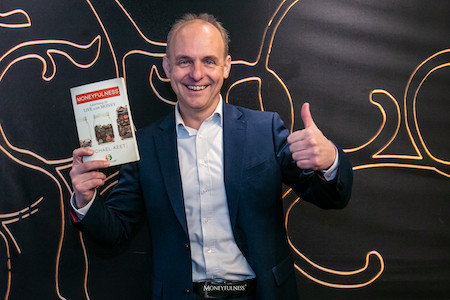As an entrepreneur, my income decreased compared to my time as an employee. The strange thing was that there was no money and no money stress. When I was working as a controller/finance director, I had enough money and money stress. Then, I became an entrepreneur without money, but also without money stress. “How is that possible?” I wondered. While analyzing this situation, I came to the conclusion that this had something to do with personal development trainings and mindfulness.
When I started out as an entrepreneur six years ago, I thought I knew a lot about entrepreneurship, the way things should be done. As an employee (business controller/finance director), I’ve reported directly to the owners of companies I’ve worked for. I had seen a lot and thought I knew a lot.
After a year and a half struggling and throwing away good money, I realized I didn’t know anything about doing business as an entrepreneur. I found myself in the position where I had two choices: quit and return to being an employee, or find out about the things I didn’t have a clue about. I chose the second option. I attended a lot of trainings like entrepreneurship, marketing, sales (marketing and sales are two completely different skills), presenting and a variety of trainings in the area of personal development.
One of the trainings was mindfulness. I felt an immediate connection. Before I was just running around, doing 1,000 things at the same time, and didn’t experience peace of mind. I was all over the place and stressed out. Mindfulness really helped me a lot. Mainly, it reduced my stress level tremendously and helped me to focus. Later on, I attended an MBCT (Mindfulness Based Cognitive Therapy) training, so I’m a licensed mindfulness coach as well. At the end, I combined my financial and mindfulness knowledge into Moneyfulness.
Moneyfulness is a combination of mindfulness and money. If you explore the philosophy and background of mindfulness, you will find all kind of subjects regarding stress, depression, burnout, anxiety, et cetera. But what causes the most stress in the USA? Money. Around 72% of all Americans experience stress about their finances. Within the concept of mindfulness, there is no scope for addressing stress that emerges from money problems.
Why the combination is so important
Mindset about money, combined with the practical organizational guidelines for your personal finances, is very strong and unique. They work together like body and spirit. As soon as you control your mind and your money, your money stress will disappear very soon.
Only “Mind”
If you only work on your mind and you don’t know how to do “money things,” you can’t make real progress. Visualize money, analyze where your inhibiting convictions come from, empower yourself, stop judging others, and believe that you control your money thoughts. But if you don’t have a clue how to do it, even though you may be on the right track, you still won’t be able to get where you want to be. You don’t recognize your unsupportive behavior and pitfalls in your bank account, so you won’t be able to avoid them in the future. If you don’t structure your personal finances, you can’t end money stress.
Only “How to”
If you’re only told how to organize your finance (“do this,” “do that”) and you don’t understand why you did these things in the past, your spending and saving patterns won’t change. Your old spending and saving habits are still anchored in your mind. You still think the same way about money, including your non-supportive convictions. You can organize your finances, but if you don’t believe you can do it, or why you’re doing the things you have been told to do, the change is not sustainable.
If you really want to change your financial life, you will need to change both your mindset and how to. If you change only one of the two areas, it won’t last very long. The short term change will definitely be there, and it might even feel great, but the chances that it will last forever ……………
A poor mindset
No true lack of money, and still feeling like you’re poor. “How is that possible?” you might wonder. “If only I had millions of dollars in the bank, imagine the things I could to.” Imagine these millions in your bank account. This question has been asked before, and a lot of people fantasize about a stuffed bank account. This is one of the reasons why lotteries are doing so well. The answers to these questions vary greatly, from traveling to a new house or new car, to going back to school or helping others and quitting the day job. Everyone has other wishes and dreams.
The 10 steps
In the coming weeks, I will share the ten steps towards a moneyful life. I will vary it with stories I saw and experienced over the past six years.
Let’s end money stress together.


